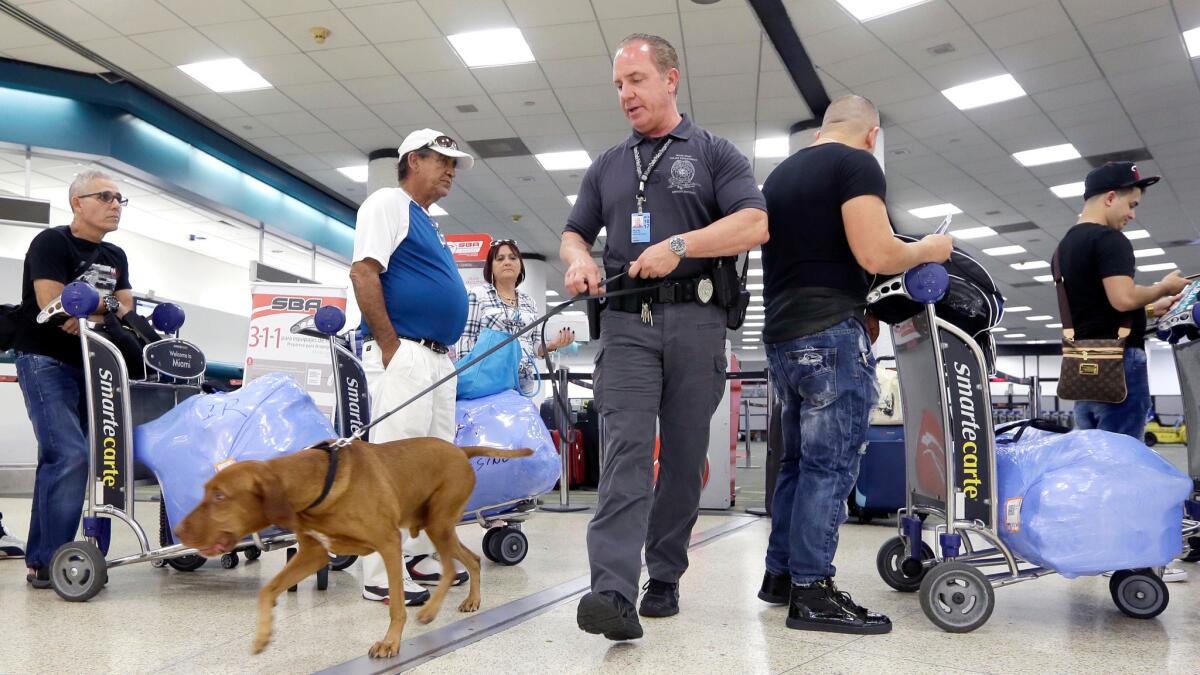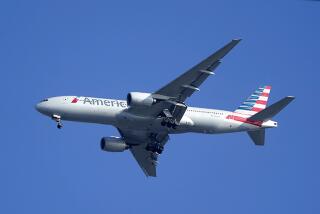Bill to boost airport security and shorten wait times gets a green light

House and Senate lawmakers announced an agreement Wednesday on an aviation bill to boost airport security, reduce screening lines and require airlines to refund fees to passengers whose bags are lost or delayed.
The bill would also extend the Federal Aviation Administration’s programs and policies through Sept. 30, 2017. The FAA’s current operating authority is set to expire July 15 — Friday of next week.
For the record:
2:13 p.m. July 6, 2016An earlier version of this article said the bill would require airlines to refund checked-bag fees to passengers whose luggage arrives more than 16 hours late for overseas flights. The time is more than 15 hours late for overseas flights.
The bipartisan agreement was announced by senior members of the House and Senate transportation committees. Approval by both chambers is expected to swiftly follow. Congress has only nine days to act in order to prevent a partial shutdown of the agency.
The bill would require airlines to refund checked-bag fees to passengers whose luggage is lost or arrives more than 12 hours late for domestic flights or more than 15 hours late for overseas flights. It also would require airlines to provide families with information about the availability of seats together at the time of booking.
A bill that passed the Senate in April by a vote of 95-3 would also have extended other consumer protections to passengers, including a requirement that airlines refund fees for other services when not delivered, such as advance seat assignments or early boarding. But those provisions, which airlines opposed, were dumped during negotiations with the House.
To address long airport screening lines, the bill requires the Transportation Security Administration to hire a marketing firm to generate greater public participation in the agency’s PreCheck expedited screening program for passengers who have been vetted and determined to be low security risks.
The bill also would require the TSA to have PreCheck screening lanes open during high-volume travel times. And it would authorize a pilot program to develop and test more efficient passenger and luggage screening systems.
Responding to airport attacks in Brussels and Istanbul, Turkey, this year, the bill also would authorize a doubling of TSA teams that stop and search suspicious passengers in airport public areas outside the security perimeter, often using bomb-sniffing dogs.
The bill would toughen the vetting of airport employees who have access to secure areas, expand random employee inspections and require reviews of perimeter security. That is a response in part to the “insider threat” problem raised by the destruction last year of a Russian Metrojet airliner over Egypt. Investigators suspect a bomb was smuggled aboard that plane.
The bill also would authorize the TSA to donate unneeded security equipment to foreign airports with direct flights to the United States. It would instruct TSA to establish a pilot program at three to six airports to reconfigure and install security systems that increase efficiency and reduce vulnerabilities in airport terminals
Among several drone-related provisions, the bill would establish a process for the FAA to designate special areas where drones may not fly. Possible examples include around critical infrastructure, chemical facilities or amusement parks. The chemical industry lobbied for inclusion of the provision.
The bill also would prohibit drone users from interfering with emergency response activities such as fighting wildfires and would raise civil penalties to not more than $20,000 for violators. Authorities across the U.S. recorded 20 incidents in which drones flew too close to wildfires last year, with more than half hindering firefighting efforts. It has happened again at least nine times so far this year.
The bill is also notable for what it doesn’t include: any plan to remove air traffic control operations from the FAA and spin them off into a nonprofit corporation.
The privatization plan was the top legislative priority of Rep. Bill Shuster (R-Pa.), chairman of the House Transportation Committee, and the airline industry. In recent weeks, Shuster backed off his insistence that any FAA bill include the privatization plan in the face of opposition from other powerful committee chairmen who did not want Congress to cede its authority over aviation matters to a corporation. Other segments of the aviation industry that feared a corporate board would be dominated by large airlines also opposed the plan.
Airlines have said that privatization is needed because the FAA’s culture is too slow and inflexible to finish the air traffic system’s transition from old radar technology to satellites. The modernization has dragged on for more than a decade and fallen short of promised financial benefits and reduced congestion.
ALSO
Half a million hoverboards recalled after dozens burst into flames
Snapchat’s new Memories tool will let you upload snaps from the past
Ousted Fox anchor Gretchen Carlson hits Roger Ailes with sexual harassment suit
More to Read
Inside the business of entertainment
The Wide Shot brings you news, analysis and insights on everything from streaming wars to production — and what it all means for the future.
You may occasionally receive promotional content from the Los Angeles Times.










